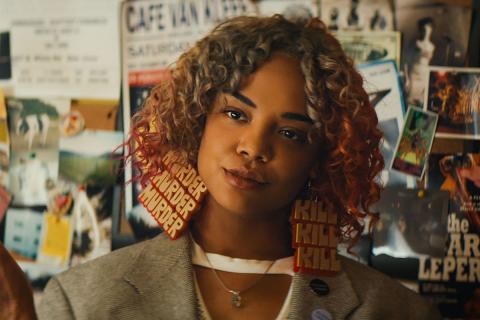There is a moment in the middle of Boots Riley’s directorial debut, Sorry to Bother, that embodies the film's core stances on capitalism and oppression. After discovering that his multi-billion-dollar slave-running boss, Steve Lift, is involuntarily turning his indentured servants into half-horse, half-human “Equisapiens” to increase their productivity (and thus, Lift’s profits), a terrified Cassius ‘Cash’ Green, Lift’s handsomely paid telemarketer and the film’s protagonist, confronts Lift about his unethical project. Lift, confused by Cash’s repulsion, responds “I just didn’t want you to think I was crazy, that I was doing this for no reason. Because this isn’t irrational.” Lift argues that his Equisapien workforce is the natural conclusion to enhanced productivity and profitability. And if the goal is increased margins, Lift’s logic is sound.
Sorry to Bother You is chock-full of these ridiculous moments that give viewers pause. The film follows Cash as he rises through the RegalView telemarketer ranks by wielding the ultimate deal-sealer: his white voice. After perfecting his white voice, Cash gets promoted to the coveted role of “power caller," which sees Cash sell Lift’s indentured servants to other companies in exchange for a 7-figure salary. However, in advancing his career and continuously crossing the striking RegalView employee’s picket line, Cash risks alienating his friends, girlfriend, and colleagues, who are protesting against both the company’s anti-union stance and the slave-labor they market in their business ties with Lift. Cash initially sides with profiteering but, in doing so, slowly realizes that he must sell out his loved ones, millions of poverty-wage workers, and his sense of morality to keep his lucrative position within Lift's company.
Riley wields absurdity to critique exploitation as an inherent outcome of capitalism. Nearly every hilarious moment within Sorry to Bother You has a nefarious underbelly that examines the human costs of exploitation through the capitalist system. These moments include the internet-famous protestor who undermines her pro-union, anti-cooperation cause by becoming the advertising face of the Soda Cola company, and Cash’s successful campaign to expose Lift’s Frankenstein-esque slave project to the general public, which results in Lift himself ringing in the stock market next to representatives from Congress after his company becomes the most profitable in human history due to the Equisapien project. Both these scenes, among others, exhibit large cooperations exploiting both workers and social movements to increase their political appeal and bottom line, regardless of how inhumane the cogs within their machines are treated. For Riley, the capitalist yearnings of Lift, American politicians, and Soda Cola further inequality and disseminate false sentiment at the behest of shareholder earnings.
Riley also examines the similarity between capitalism and racism through the misguided upwards mobility of Cash. Though he quickly becomes a power caller, Cash only does so by departing from his audible blackness within the work environment and company outings. These outings include Lift’s lavish party/orgy, where Lift hounds Cash with questions about “gang violence” and asks him to freestyle in front of his fellow partygoers (since Lift thinks all Black men can rap). And aside from being treated as a diverse prop and downgrading his blackness to climb the cooperate ladder, Cash’s ultimate reward for selling out is a $100,000,000 five-year contract to be the “Equisapien Martin Luther King Jr.,"--a ploy by Lift to represent his company’s interests by using an Equisapien figure-head to control his mutated workers. Here, Riley uses Cash's disillusion to deliver his most scathing critique of Black capitalism. As an African American ascending to a seemingly important role and freeing himself from financial hardship in the process, Cash must abandon his sense of community, morality, and blackness as a whole. And Cash’s ultimate reward for becoming a capitalist yes-man, and selling out his people in the process, is being paid to become a horse. Riley uses Cash’s character arch for his film’s two central critiques: one, that capitalist upwards mobility requires a degree of sacrificed blackness (or selling out the community), and two, that stories of individual uplift are often indicative of an individual working with the corrupt society rather than the corrupt society working for the individual.
Through its substance, Sorry to Bother You proves to be an exceptional anti-racist film that combines thought-provoking critiques of capitalism and racism with absurdity and sharp wit. Riley’s film is highly original, avoids any anti-racist clichés or thematic tropes, and contains an analysis of capitalism that, before very recently, was often devoid of critique within cinema. For its creativity, quality, depth, Sorry to Bother is one of the strongest anti-racist films around.
Score: 5/5
